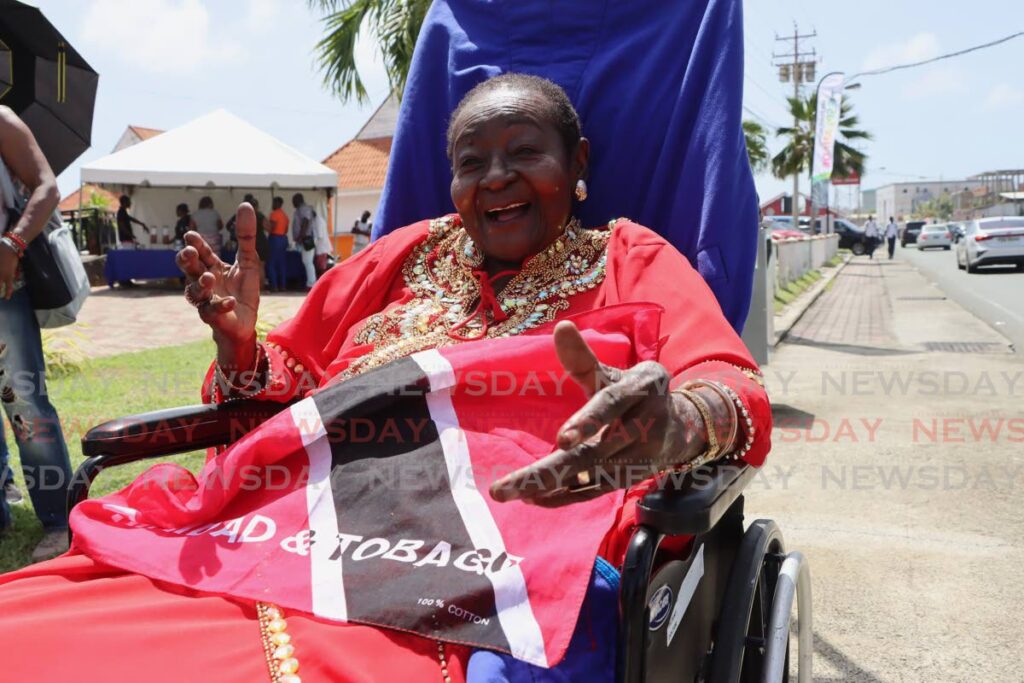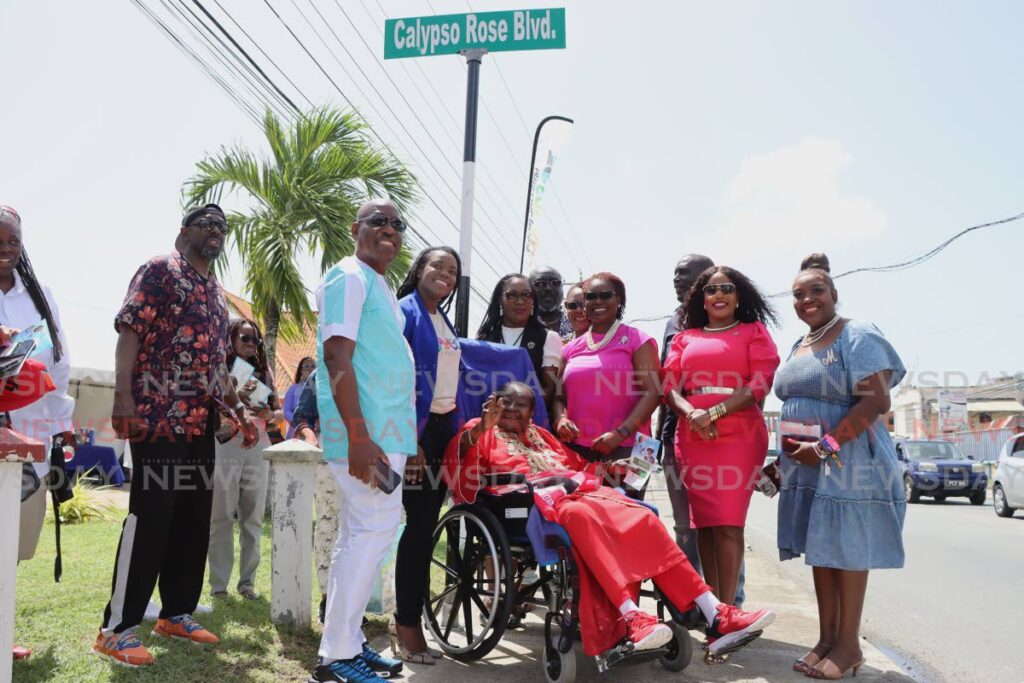Calypso Rose: Tobago carnival was fantastic

SHE overcame a speech impediment, blazed a trail for generations of female calypsonians, and, to date, is the only artiste from the Caribbean to receive the French Grammy award.
Calypso Rose accepted the Victoire de la Musique award for the World Music Album of the Year in Zenith, Paris, in 2017. The award is considered the "French Grammys."
“No other artiste of the Caribbean has ever received the French Grammy,” the calypso icon, 84, declared in an interview at the Hochoy Charles Administrative Complex, Tobago, on October 28.
The interview, hosted by the Department of Information, Office of the Chief Secretary, came on the heels of a simple function in Scarborough on October 25, at which the THA honoured Rose and seven other Tobago icons. Milford Road in Scarborough has been renamed Calypso Rose Boulevard.
The interview, which took place before a live audience, revisited salient aspects of the calypso legend’s life: the struggles she encountered as a young woman in a male-dominated artform; her globetrotting career; and, most recently, attending her first carnival in the land of her birth.
Rose, whose real name is Linda McCartha Sandy-Lewis, also composed a special song for the carnival.
Of the experience, Rose said, “It was very, very great. When I heard that Tobago have their own carnival, I say, 'I have to write something for Tobago carnival.' And now that I am here and I have seen the Tobago carnival for the first time in three years, I am proud and happy to be here. It was fantastic. I figure the carnival could go for some more days.”
She vowed to continue writing songs for the carnival.
Rose, who was raised in Bethel, started singing in public in 1955 at the age of 15. Encouraged by the support of her fans, she continued in the artform.
“I said, ‘Lord, doh ever let me stop. Let me continue,' and I have continued up to now.”
Calypsonians, she reasoned, are reporters in song.

“It might not be on a pen and paper, but in song, because we are opening people’s eyes, opening heads-of-government ears and they are seeing what we are doing and they are hearing what we are saying. You have to listen, learn and accept what we are saying.”
But she struck a sad note among the audience when she recalled the reasons why she left Tobago.
Rose claimed during her early years in the artform, the government of the day was not focusing much on the island’s development.
“Look, when I wrote the calypso about Tobago and how the government is treating Tobago, that throw me out of my birthplace, Tobago – Take yuh money and go– because I had seen what the government was doing for Tobago. Tobagonians were suffering.”
Rose said at that time, Tobago did not have a deepwater harbour.
“The boats had to come and park way over by the rocks and I say, ‘We want a deep sea harbour in Scarborough so the tourists could come and spend a day in Tobago.'
“I spoke about the hospital. The nurses and doctors were suffering. 'Minister of Health, allyuh please do something. Allyuh band down allyuh eye, allyuh cock up allyuh ear. Oh Lord. have mercy.'”
She said that song “ran me out of the country, which is Tobago. But thank God they did that to me because look at me now."
Rose said she has performed all over the world, including Australia, New Zealand, Africa, London, France, Barbados, San Francisco and Jamaica.
Referring specifically to Barbados, she said she wrote the calypso May Day Mas for the island’s Crop Over festival.
“That calypso introduced carnival in Barbados.”
Rose also recalled a health scare in which her lungs collapsed and she lost four pints of blood.
“When your lungs collapse, what you think? Is death. I went home and Jesus said, ‘No, it is not time for you to go. Go back and finish the job I give you to do.' And I am here until now.”
The calypsonian said her performances with late music legends Aretha Franklin and Bob Marley had been the most memorable moment of her career.
“I performed with Bob Marley in England, London, Scotland and in Miami, on a Sunday in Miami that was sold out and it was in a park and the beach was right there. When I was finished he said, ‘Sister Rose, you very good. Keep it up.’”
Rose said four years ago she performed with two of his sons in Denmark.
Asked about the song she performed on the same stage as Franklin, Rose sang, “Oh Tobago, the island that seems unreal/So Tobago, for you I feel/Oh Tobago, beautiful as you are/Shining like a morning star.”

She recalled she also sang her classics Fire, Fire and Going Down San Fernando.
Franklin, she said, declared, “You are great, very, very good.”
Rose said Fire, Fire has been sung in nine different languages, including Japanese.
“So Fire, Fire, is still around. It eh out yet.”
She told the audience about the inspiration for the song.
“I was staying in St Croix and every weekend they would fly us to Puerto Rico to perform in a club. Only tourist boats come in. So I learnt the Spanish there. I wrote the first verse in St Croix and then I left to come home to Trinidad for Carnival, and the second verse, I wrote it in Barbados in the hotel.”
Rose said the last verse was composed in Tobago.
For now, she is just very grateful to be on the island.
“Look at the song I wrote a couple of weeks ago for the Tobago carnival.
Get up. get up, let’s go, is carnival in Tobago. Remember October is mas over here. So tell Tambrin (radio station) that we coming, keep the music pumpin.
In May, the Tobago Performing Arts Company paid tribute to the calypso luminary in a musical showcase titled Queen of the Road. The piece was written by Rhoma Spencer.

Comments
"Calypso Rose: Tobago carnival was fantastic"